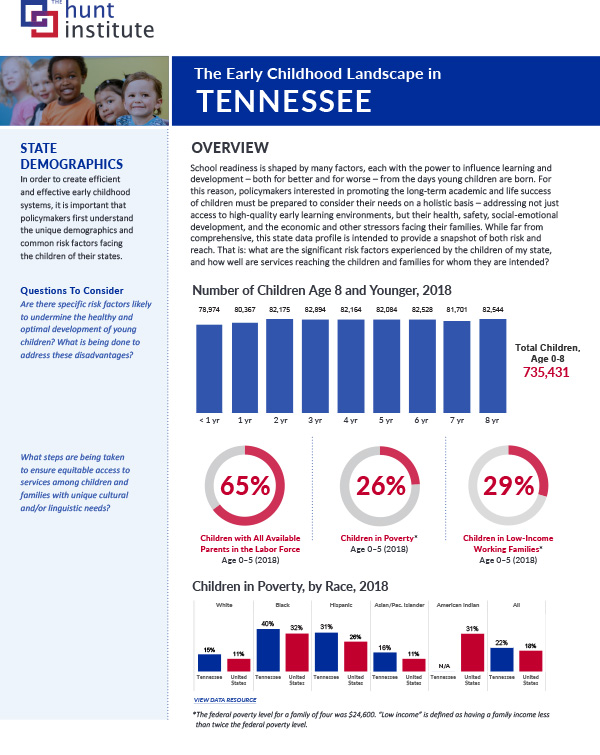In January of 2020, The Hunt Institute—an education policy non-profit based in Durham, NC—released updates to its State Early Childhood Data Narratives. These comprehensive profiles highlight both demographic and early childhood access data from all 50 states and the District of Columbia. To learn more, Early Learning Nation sat down for a Q & A with Dr. Javaid Siddiqi, the Institute’s president and CEO.

What is The Hunt Institute’s goal for compiling and releasing these state data narratives?
At The Hunt Institute, we work with senior-level state elected leaders on issues of education policy, so we’re always looking for opportunities to help this audience make data-driven decisions. After nearly 20 years as a nonpartisan leader in K-12 education policy and political leadership, the Institute has evolved to broaden its policy focus to encompass the full continuum, from prenatal care and early childhood to postsecondary education and the workforce.
We believe the best public policy is grounded on data, but when it comes to early childhood policy, this can be a challenge because it’s so multidimensional that important information is sometimes spread across many reporting sources.
Every year there are important reports that focus on child well-being and demographic data, for example, and others that do a great job of zeroing in on prekindergarten enrollment or child care workforce data, but surprisingly few places where all of the pertinent early childhood policy data is pulled together into a single resource. That’s what we attempted to do with our State Early Childhood Data Narratives when they were first released in 2018: create a one-stop shop for policymakers.
This Wednesday (February 12, 2020), at 1:00 p.m. ET, Dr. Siddiqi and the Hunt Institute’s Director of Early Learning, Dr. Dan Wuori, will host the Hunt Institute’s Intersection Webinar, sharing highlights from the 2020 State Early Childhood Data Narratives. The webinar is open to the public but requires advance registration. To participate, visit the registration link here.
The recently released 2020 Narratives reports contain real-time updates to the data, a disaggregated look at key data points by race and ethnicity to help inform equity conversations, and new estimates of access to Child Care and Development Fund subsidies and Early Head Start by infants and toddlers.
What are your plans for presenting your findings to decision makers?
We use these Data Narratives extensively throughout the year as we work with elected leaders, whether in the context of a state legislative retreat, our annual Early Childhood Leadership Summit, or in support of our Hunt-Kean Leadership Fellows. We don’t want to see these Narratives limited to our internal use alone. The narratives from all 50 state and the District of Columbia are available to the public on our website so we hope they’ll continue to be used widely by educators, philanthropy, the advocacy community, journalists and anyone else who might find them helpful.
How do you hope activists, policymakers and academics will use this information?
At The Hunt Institute, our work is both nonpartisan and non-advocate in the sense that we don’t direct elected leaders toward any specific policy agenda. But ultimately, we hope that policymakers will take advantage of this resource to make things better for the young children and families of their states.
It’s our hope that regardless of your role or rationale for seeking the Narratives, you’ll find them useful, thoughtfully curated and carefully sourced.
Did the info for any particular states especially surprise you?
Yes and no, really. Demographically, the data bears out a lot of things that are pretty well established. States that have long struggled with generational poverty, for example, tend to reflect that in measures of their child well-being and birth outcomes. That’s not exactly surprising, but it’s critical to keep that data front and center with policymakers.

On the other hand, certain data points really reflect the power of states to effect change through legislative action and administrative policy. It’s not by accident that North Carolina leads the nation in developmental screening rates (58%), for example, or that Washington, D.C. serves 79% of its preschoolers in public prekindergarten programs. These are the results of specific policy decisions and the dedication of the resources necessary to make these things happen. To me these are the kinds of data points that warrant the most attention by policymakers because they speak to what can be done.
What lessons can we draw from comparing states?
I think there is always value in gauging the well-being of children and outcomes being achieved by one’s individual state, both in comparison to regional and “like” states, and with the nation. For policymakers, in particular, we hope the Data Narratives provide an opportunity to take stock and look at what they might learn from both the policy successes of—and challenges experienced by—other states, with an eye toward improving the lives of children in their care.
Tell us a little about your own story and what drives you to work on these issues.
I began my career in education as a high school science teacher, before becoming a school principal in Chesterfield, VA. I served as the deputy secretary of education for the state of Virginia, then secretary of education, under former Governor Bob McDonnell before joining the Hunt Institute, initially as the Director of our Hunt-Kean Leadership Fellows program.
I’ve always believed that education, and early childhood education with a specific policy focus on the years from zero to three, has the power to transform lives for the better–which is why I’ve made early childhood a priority focus area for the Institute as we work with policymakers.

Mark Swartz
Mark Swartz writes about efforts to improve early care and education as well as developments in the U.S. care economy. He lives in Maryland.



